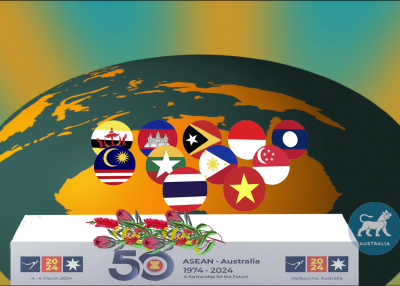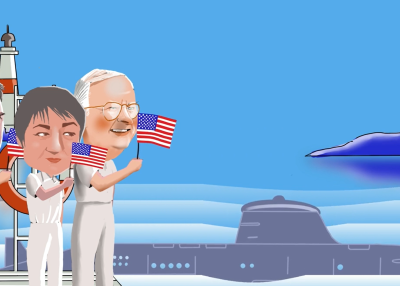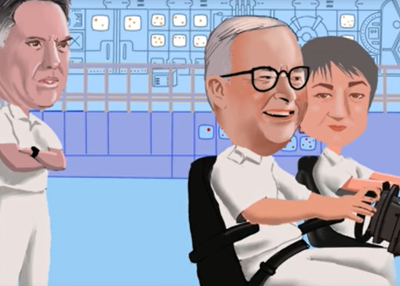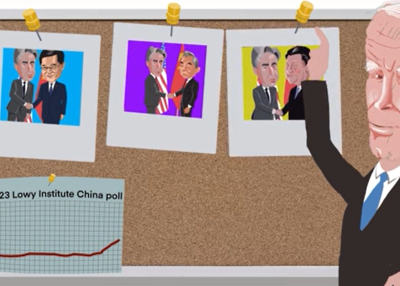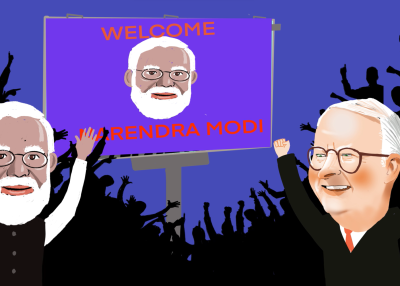Briefing MONTHLY #32 | October 2020
Managing China | Middle power moments | Supply chains
Asia Briefing LIVE 2020 Special Edition
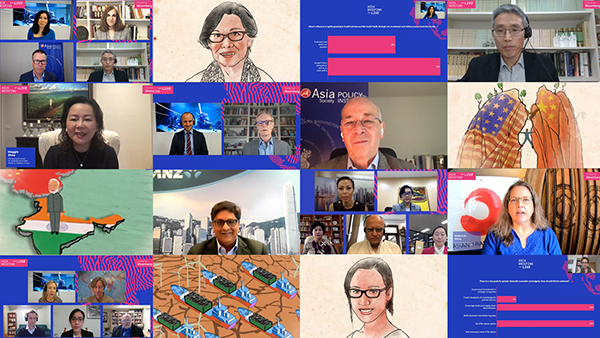
LIVING WITH A DRAGON
China remains the most important Asian business partner for Australia and this will require better diplomatic management by the Federal government to find ways with work with this reality. That is now the consistent message from polling of participants at Asia Society Australia’s Asia Briefing LIVE (ABL) over the past three years despite China’s rising assertiveness.
Sixty per cent of respondents at last week’s conference supported accepting China’s rising power and working with it over pushing back and asserting Australia’s position. While that is a trend decline over five events in three years, it is the rolling average response. At the same time China has been consistently backed as the biggest opportunity for Australian business and was chosen by 43 per cent of participants last week. India has been consistently chosen by about one quarter of participants, while Indonesia has drifted down slightly from above India to the same at 23 per cent last week. And poll participants continue to see the government’s management of China as clumsy and inconsistent with a 69 per cent of participants choosing that option last week.
Attitudes towards the post-COVID world have been consistent over the two events held this year. In April, 59 per cent of participants thought the post-COVID global order would feature stronger regional groupings built around middle powers, and the sentiment last week was only slightly lower at 55 per cent. But there was rising sentiment last week for a revival of the nation state. And when it comes to domestic economic sovereignty, trade and supply chain diversification remains the most popular policy approach favoured by around 40 per cent of participants.
See the latest polling results in DATAWATCH below.
NEIGHBOURHOOD WATCH
POWER: CAUGHT IN THE MIDDLE
Illustration by Rocco Fazzari.
Is this the middle power moment when new diplomatic architecture rises to the challenge or just a time when smaller countries find themselves desperately responding to the latest great power clash? In a contrast to the audience polling above, four analysts from India, South Korea, Indonesia and Singapore tended more towards a revival of nation states in a post-COVID world – but amid a flowering of new middle power cooperation.
The Quad: Former Indian national security adviser Shivshankar Menon argued great power tension like that now occurring between China and the US actually opens up space for the middle powers to deal with transnational issues which are beyond the power of any great power. And since multinational institutions are only as good as their members, if the great powers are divided the institutions will also be divided, creating a need for new ways of conducting diplomacy. Citing the Quadrilateral Security Dialogue as an example, he said it is still looking for a real role and will need to find areas where other countries work with the four founders – the US, Japan, India and Australia. “It’s a dialogue forum. But taking it beyond that will require participation, working with others, and an expansion and an identification of very clear functional areas where it has uses.”
New Cold War: Indonesian Institute of Sciences research professor Dewi Fortuna Anwar said the world is not returning to a new Cold War because the China-US tensions are not primarily ideological. “Most of the competition between the US and China is actually sectoral in nature, it’s a trade, its technology… There are many, many issues but they tend to be functional so there is actually potential for reaching agreement in each those sectors,” she said. And she argued that great power competition is not new for Southeast Asian countries and they are used to trying to avoid their region becoming a zone of conflict between external powers. So, she said: “This is what we call the middle power moment.” However, she conceded that one of the world’s once promising middle power groups MIKTA (which includes Mexico, Indonesia, South Korea, Turkey and Australia) had not proven so successful because of differences about democratic cooperation.
History issues: East Asia National Resource Center fellow June Park suggested that the continued tensions between Japan and South Korea over old historical grievances, despite a new Japanese prime minister, underlined the potential limits of middle power cooperation. The two countries have allowed their old differences to spill over into restraints on bilateral technology trade in a way that undermines their participation in middle power cooperation to deal with China. “This kind of bilateral friction between Japan and South Korea does not help Washington at all with regard to (its) efforts to try to group countries together to collaborate,” she argued. This, for example, would limit South Korean participation in US efforts to create a NATO-style security alliance in Asia.
Each way bet: Singapore ambassador-at-large and Asia Society co-chair Chan Heng Chee said smaller regional countries were coming together in a “middle power moment” in a way that allowed them to avoid choosing between the US and China. She cited Japan’s revival of the Trans-Pacific Partnership (TPP) after the US exited that agreement and Southeast Asia’s sponsorship of an inclusive Indo-Pacific strategy as demonstrating this approach. And she said Singapore had shown how to do this by being open and frank with the great powers about why it makes choices in its own interests. “This is a path we hope we can keep but it is getting more difficult. Choice is really a series of small choices, not a binary decision… Countries sign up for individual initiatives (like the TPP or Belt and Road Initiative), they don’t just gather at a grand meeting and say I’m on this side or that side. So, I think over time… most countries would like to be able to choose from both sides.”
DIPLOMACY: BIDEN CALLING
The Asia Briefing LIVE panels revealed an emerging consensus between both economic and security analysts that a Joe Biden Administration in the US would result in a changed global approach to China because the new President would be in regular contact with other world leaders.
Bloomberg chief economist Tom Orlik predicted: “Beijing will face a new interlocutor in Biden who would be better (than Donald Trump) at picking up the phone to allies.” Peterson Institute for International Economics chairman Adam Posen said the overall relationship with China would not improve under a new Administration because some Democrats would step up criticism of China over new issues such as human rights. But he said Biden would work more consistently and effectively with allies to encourage better behaviour.
Singapore ambassador-at-large Chan Heng Chee said there would be a better framework for managing China. “There will be greater predictability and (Asian) countries like predictability. I think Biden’s team will want to confront China but also work with China,” she said.
TAIWAN: CRISIS LOOMS
The world should be paying more heed to the risk of military clash between the US and China over Taiwan even though both countries did not seek a war, according to US security policy analyst Bonnie Glaser. She said that more needed to be done to improve crisis communications procedures between the two countries although such action was unlikely to happen in the current environment.
“Even if the risk is low at 15 to 20 per cent that is still quite significant because we are talking about two nuclear powers. If they went to war it could be difficult to control escalation,” Glaser, director of the China Power Project at the Center for Strategic and International Studies, told the conference. “It is a dangerous situation. Yes, there is a risk of an accident. I don’t believe either the US or China want to go to war. But there could be a crisis. Don’t rule that out.”
She said China had become more concerned about Taiwan not so much because of the actions of the Taiwanese government but because of the actions of the Trump Administration in strengthening of the US-Taiwan relationship.
Meanwhile Glaser disputed the idea that the US was in “inexorable decline” arguing that it had many strengths and the key problems was the pursuit of bad policies which could be corrected. Nevertheless she conceded: “The gap between US power and Chinese power will narrow and in many respects it already has. The period in which the US has come to be considered the sole super power has probably come to an end and so the United States needs to figure out how to work with other like-minded countries to strengthen the international rule based order.”
ASIAN NATION
CHINA: REALISM NEEDED
Illustration by Rocco Fazzari.
Australia should be cautious about deliberately diverting trade away from China to avoid coercion when that could end up actually costing the country financially, according to a former senior diplomat.
Asia Society Policy Institute senior fellow Richard Maude told the conference diversification was good in principle for dealing with a shock like a pandemic, rather than just China. But it was not clear that there were obvious replacement export destinations or that Chinese trade sanctions were really having a significant overall economic impact so far.
“I think a dose of realism is needed. There is no other market in Asia or anywhere in the world that can simply replace China for many of our most important exports. There remain some quite significant barriers to our trade with other nations in Asia like India and Indonesia and they have proven quite difficult to remove in the past,” the former Department of Foreign Affairs and Trade deputy secretary said. “I don’t see any point at the moment in pre-emptively making ourselves poorer by artificially diverting trade away from China that might not ever come under significant risk.” He noted that Australian government policies over the past few years didn’t show much evidence of China having significant leverage.
Meanwhile Deakin University associate professor Chengxing Pan said the world was becoming more interdependent and so while the world needed China, China also needed the world. He argued that while some of China’s actions were seen as economic coercion they were also China’s response to perceived containment.
FOREIGN INFLUENCE: STICKER SHOCK
The Federal government’s plan to rein in foreign interference with new legislation reinforcing its control over foreign affairs has come under question for creating an unwieldly administrative burden for everyone involved.
Former senior diplomatic official Richard Maude said the government aim to make sure states and other institutions didn’t cut across the national interest in foreign policy was not unreasonable. But the Foreign Relations Bill – which is now being reviewed by a Senate committee – was “very broad in its scope” and captured agreements which may not be legally binding. “We are talking about thousands of arrangements and that could be an enormous administrative burden for state governments and departments, for universities and other organisations.”
He said it was not particularly reassuring that the latest Federal budget had allocated $25 million to his old department to administer the new legislation, underlining how there would be a management burden for it as well as the institutions which had entered into agreements with foreign partners.
DEALS AND DOLLARS
Illustration by Rocco Fazzari.
TRADE: FRAGILE SUPPLY CHAINS
The Federal Government special freight adviser Michael Byrne has warned that it will take years to unravel the shocks to global trade caused by the pandemic.
“The (international) air freight networks at the moment only survive on (government) support. So, they are much more fragile than everyone thinks in my view,” he told the event. Byrne spent 30 years as an executive at the Linfox group before being appointed the Federal Government’s coordinator general of freight when the pandemic hit.
He acknowledged that there was a lot of concern in international institutions such as the World Trade Organisation about what countries were doing in the national interest, including de facto airline nationalisation, but this would require a long time to resolve. “I think there will be some very tough discussions over the years on that. In some ways there will have to be a different framework of what is deemed compliant or not. The political class are going to have to spend a lot of time debating that in Geneva or elsewhere. I don’t think there is a simple pathway at the moment.”
But after taking over national freight management and seeing international flights to Australia shrink from 9000 in January to 1200 in April, Byrne said he had never seen better cooperation between government and industry. “People are more engaged than I have ever seen in my working life probably because the problem is so big.”
RECOVERY: TRADE DEALS RULE
Australian companies are well placed to navigate the new supply chain uncertainty because successive governments have negotiated high quality trade deals, according to Asian trade analyst Deborah Elms.
“Most of them are quite good for firms, they are deep, they are broad and they are very useful for firms,” the Asian Trade Centre director and Asia Business Trade Association vice chair told the Asia Briefing LIVE supply chain session. Elms argued that better use of provisions in trade deals will be a crucial recovery mechanism for all businesses and will require them to pay more attention to the multiplying number and quality of various deals which are often now on offer.
“We are in new space with new concerns being raised. National security is one of them that many governments are using to avoid what would otherwise have been their obligations (on more open trade). We are going to see that tension rise more… That level of change is going to cause some enormous problems in the global economy and it will leave firms looking for opportunities at home and looking to use other forms of trade mechanisms. Trade agreements are one way to lower the risk and increase certainty and increase their certainty against other firms that haven’t been using trade agreements,” she said.
BUSINESS: SHARING RISKS
While businesses using complex supply chains have been exposed by the pandemic shutdowns, some told the conference they had been surprised by how fast recovery can occur. Alibaba Australian managing director Maggie Zhou said she had been surprised how fast businesses using her ecommerce platform had responded to changed trading conditions.
“What we did see was how quickly some of these businesses adapted to the new environment,” she said of the way businesses in both Australia and China managed to source materials domestically in each country rather than import them.
Nick Mann, the Australian managing director of H&H Group, which owns the Swisse brand, said that while this year had exposed the fragility of disintegrated supply chains, his company had come through with little disruption. “We were amazed at how adaptive and resilient the supply chains really were. Ultimately it just gets back to really close working relationships, lots of sharing of information and great honest and open partnerships,” he said.
His company reshaped its inventory supply chain by sharing the risk with suppliers to see where disrupted demand for products would settle. “Deep partnerships, sharing challenges and dividing our risk on the back of some very horrible forecasting which puts a lot of strain on many parts of the business,” is how Mann characterised his recovery approach.
DATAWATCH
TAKING THE PULSE: AUDIENCE POLLING
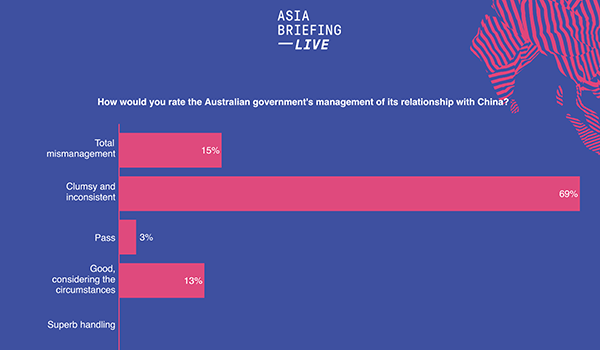
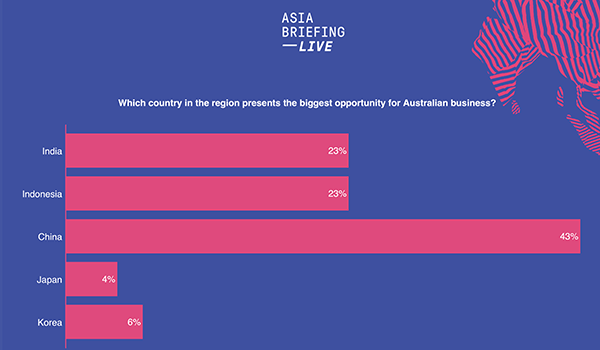
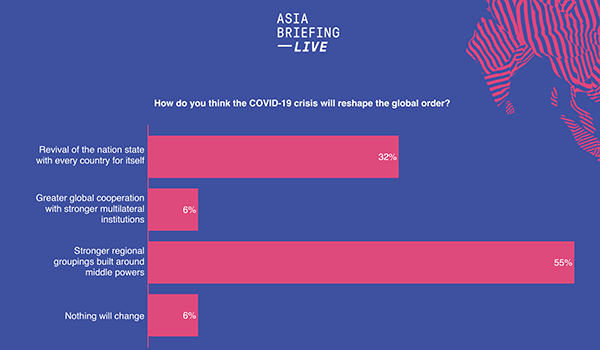
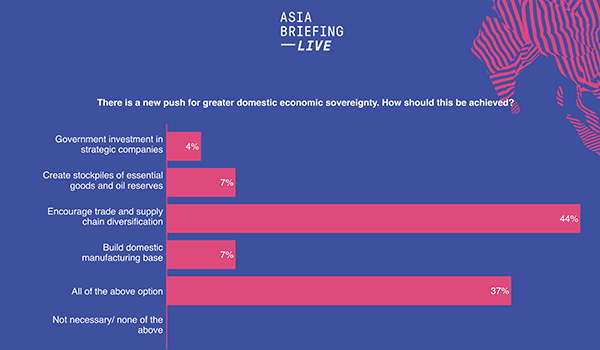
DIPLOMATICALLY SPEAKING
“Can I ask each of the three witnesses to very briefly tell me whether they are willing to unconditionally condemn the Chinese Communist party dictatorship? It’s not a difficult question.”
-Senator Eric Abetz, Commonwealth Parliament Foreign Affairs, Defence and Trade References Committee, October 14
“Some of the messaging we have seen from elements in Australia, particularly in the Parliament, has been a little bit ill-disciplined. I'll probably take a hit for saying that, but the fact of the matter is in the sensitive relationship we have, people should leave it to the Prime Minister, the Foreign Minister, the trade ministers, the people who are carrying the responsibilities for making statements and messaging about China.”
- Former Chief of the Defence Force Angus Houston, Lowy Institute, October 14
ON THE HORIZON
MYANMAR VOTES

Supporters of the governing National League for Democracy and the opposition Union Solidarity and Development Party on the campaign trail. Picture: AFP
Myanmar is due to go to the polls on November 8 amid virtually none of the enthusiasm and optimism that existed in 2015 when Aung San Suu Kyi’s National League for Democracy (NLD) came to power. The government appears committed to proceeding with the election as scheduled despite calls from opposition parties and other observers to delay it due to rising COVID-19 cases and the risk the election will fuel the infections.
Voters will be choosing about 1200 members for the House of Nationalities (an upper house) and the House of Representatives, along with local assemblies. But an additional quarter of seats are filled by the military. The President is chosen by an electoral college of new legislators.
The 2015 election represented a return to a limited form of democracy after decades of military rule and raised hopes the process would continue at this election. But instead the pandemic may keep voters away from the polling stations and the NLD is seen to have not delivered on reforms expected in 2015. The biggest turnaround involves the minority Rohingya Muslims who were able to participate in the controlled 2010 election, were increasingly disenfranchised in 2015 and have now been substantially forced out of the county into refugee camps in Bangladesh.
Melissa Crouch explains how much the landscape has changed in this piece from the Lowy Institute’s The Interpreter.
ABOUT BRIEFING MONTHLY
Briefing MONTHLY is a public update with news and original analysis on Asia and Australia-Asia relations. As Australia debates its future in Asia, and the Australian media footprint in Asia continues to shrink, it is an opportune time to offer Australians at the forefront of Australia’s engagement with Asia a professionally edited, succinct and authoritative curation of the most relevant content on Asia and Australia-Asia relations. Focused on business, geopolitics, education and culture, Briefing MONTHLY is distinctly Australian and internationalist, highlighting trends, deals, visits, stories and events in our region that matter.
We are grateful to the Judith Neilson Institute for Journalism and Ideas for its support of the Briefing MONTHLY and its editorial team.
Partner with us to help Briefing MONTHLY grow. For more information please contact [email protected]

This initiative is supported by the Judith Neilson Institute for Journalism and Ideas.


